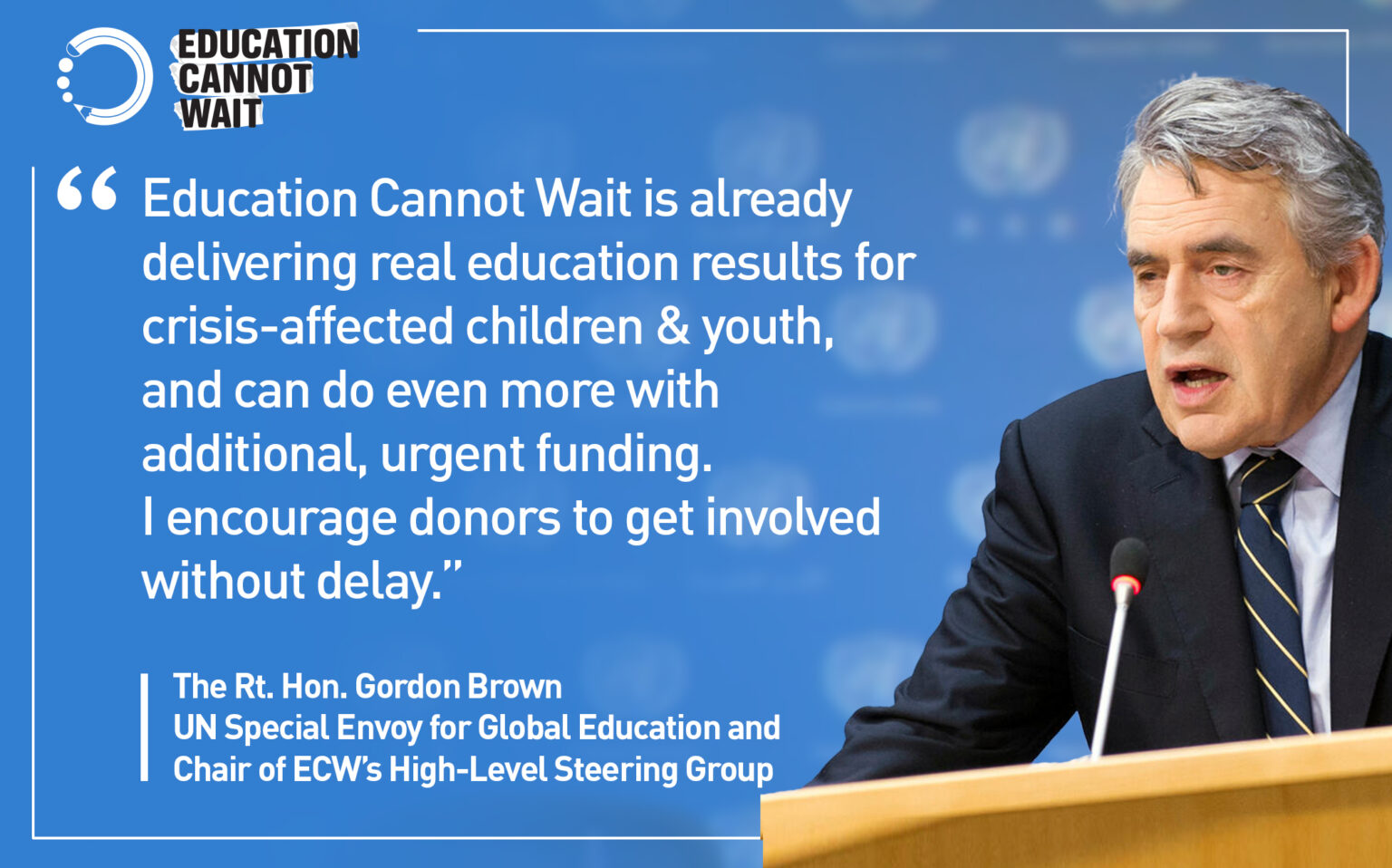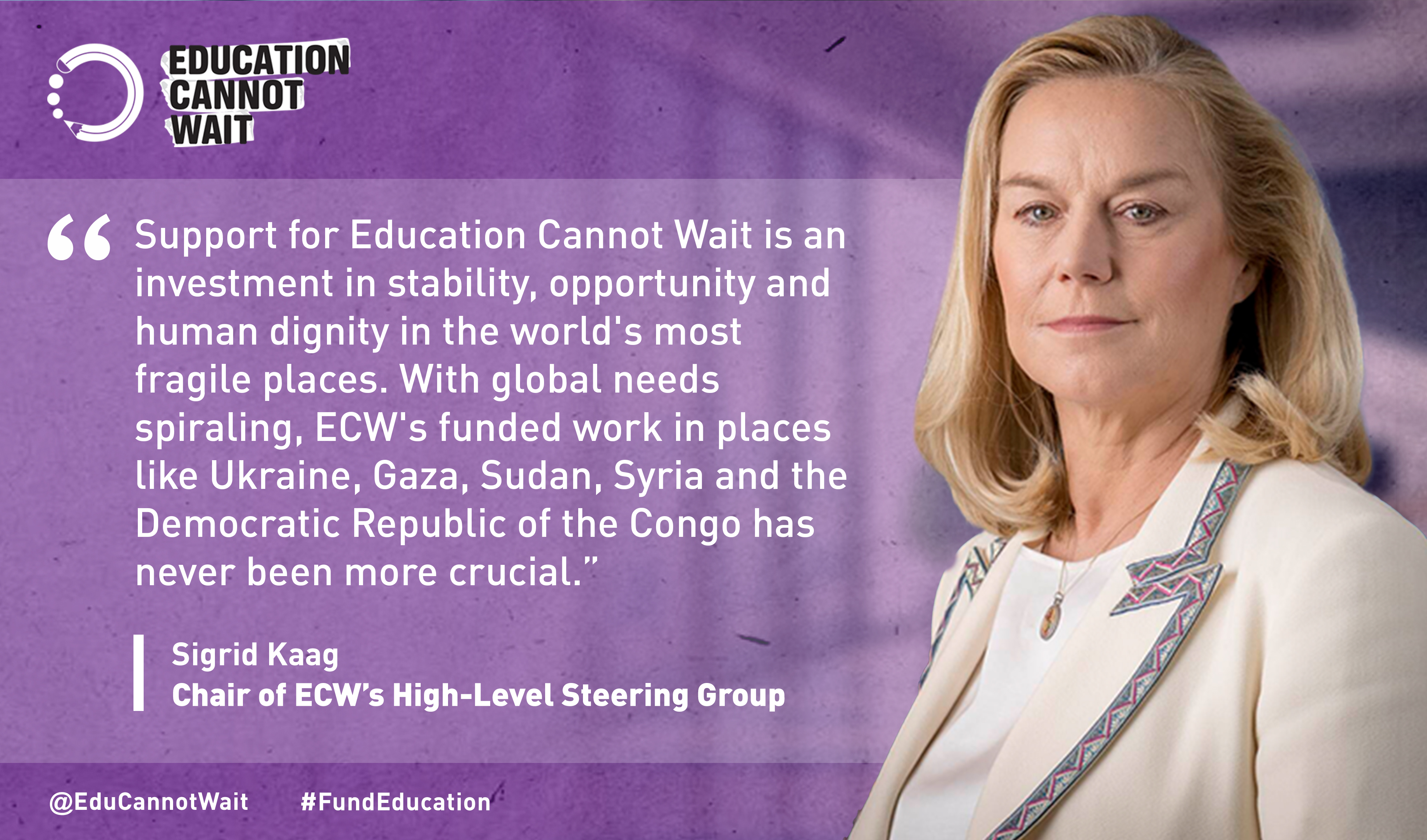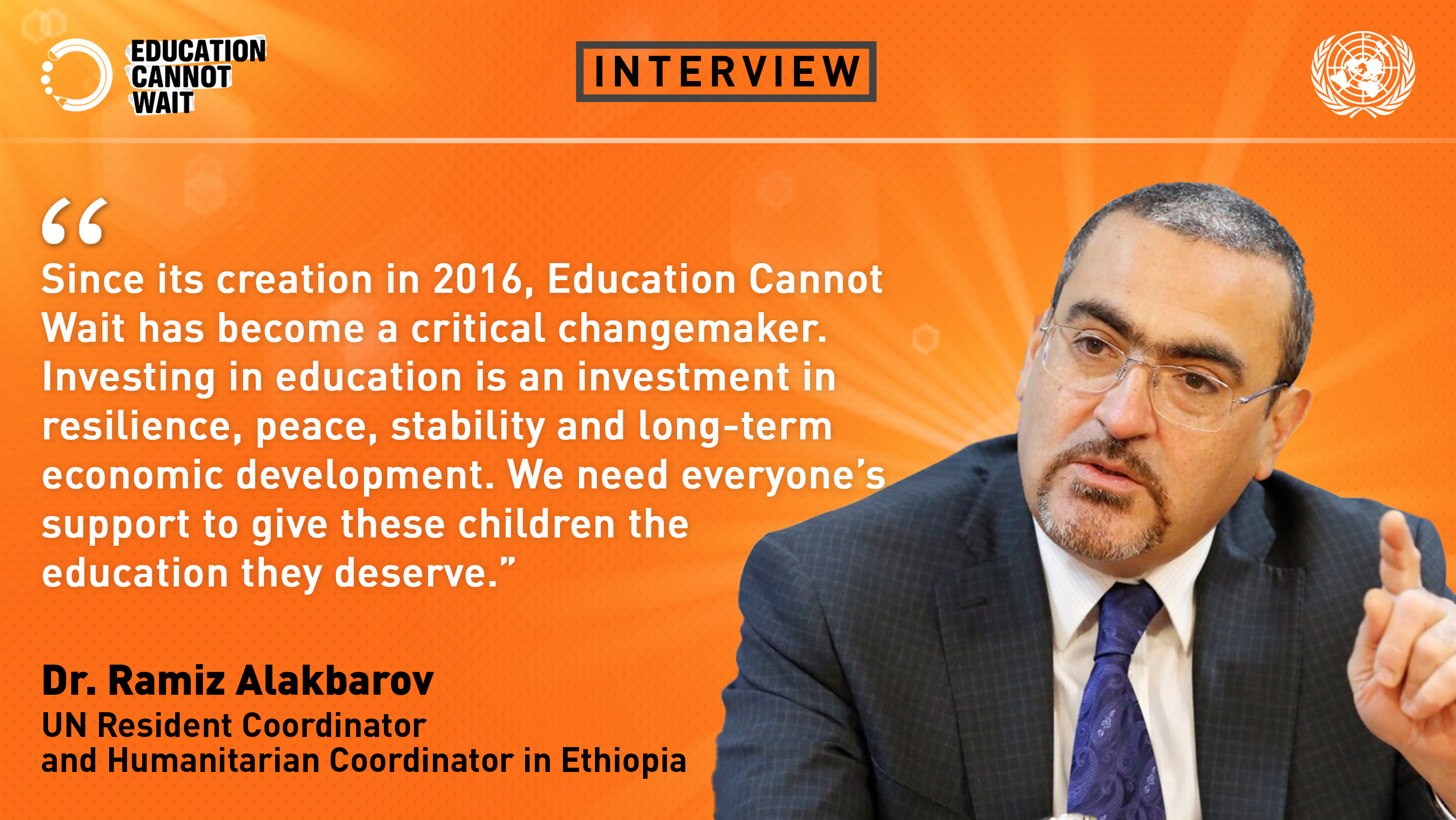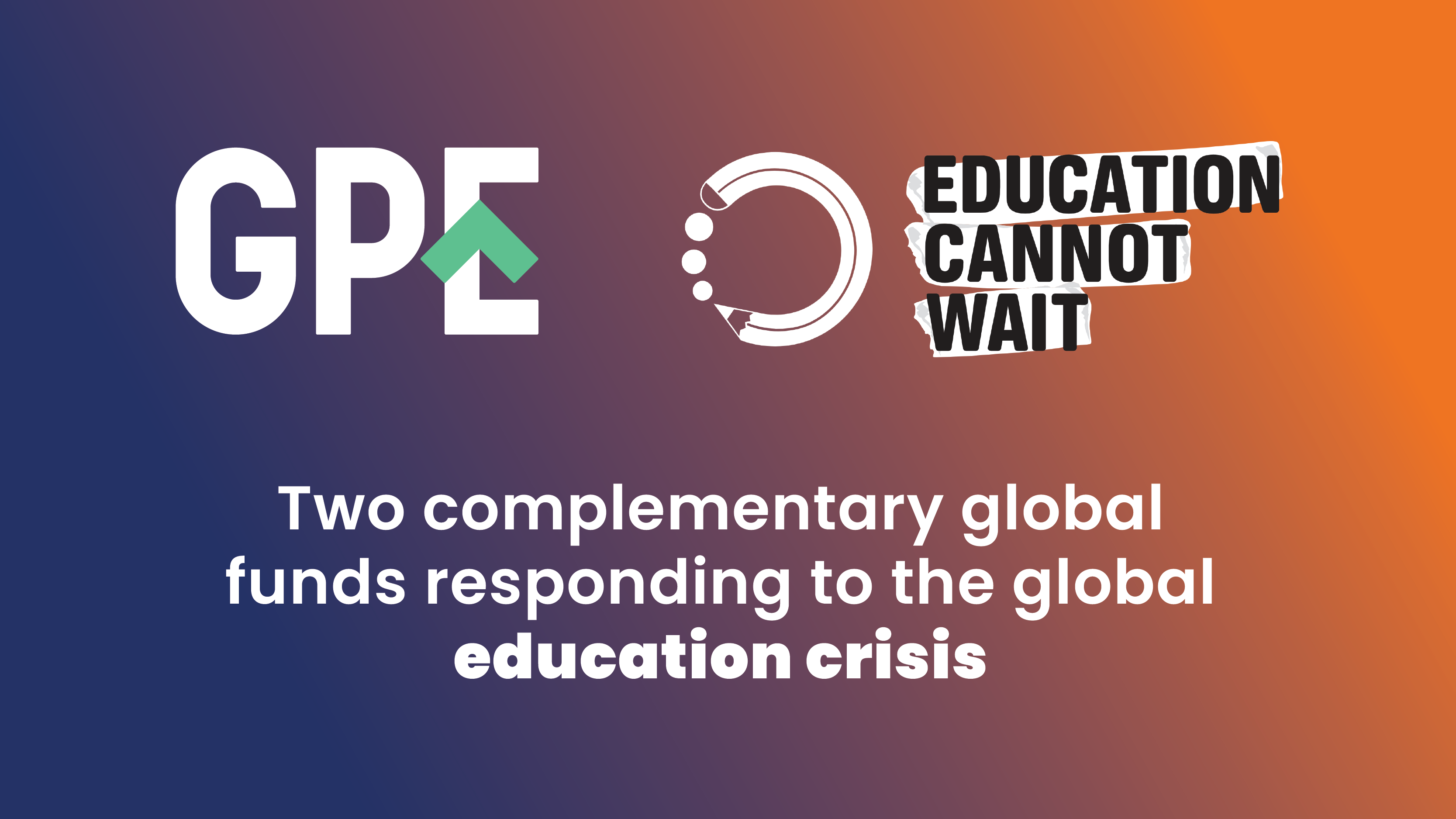Education Cannot Wait Interviews the Rt. Hon. Gordon Brown, UN Special Envoy for Global Education and Chair of ECW’s High-Level Steering Group

ECW: You played a critical role in establishing Education Cannot Wait just five years ago. As the Chair of ECW’s High-Level Steering Group, what are some of the key successes achieved by ECW over the last five years; and what needs to be done in the next five years as we approach the 2030 Agenda for Sustainable Development deadline?
The Rt. Hon. Gordon Brown: Education Cannot Wait has had to deal with increasingly difficult challenges, from Myanmar, Syria and Yemen to the Sahel and now Afghanistan. Yet it is delivering beyond all expectations – with speed in its humanitarian efforts and depth in its coordinated approach to development – and is supporting our global efforts to achieve the Sustainable Development Goals, especially SDG4. This work – delivered in partnership with governments, donors, UN agencies, civil society organizations, the private sector and other key stakeholders, including the media – is having positive, concrete impacts aiming to ensure inclusive and equitable quality education for the world’s most vulnerable children and adolescents.
In just five years, the ECW Trust Fund has mobilized over US$1.1 billion and has a growing number of public and private sector donors. In January, ECW received its single largest contribution – an additional €200 million from Germany – which is now the Fund’s largest donor, followed by the United Kingdom and Denmark. At the country-level, an additional $1 billion worth of programming has been aligned to ECW multi-year resilience and joint programmes.
ECW and its partners have delivered investments in 42 countries to date. This includes 24 countries experiencing protracted crises supported through multi-year resilience education programme investments and 35 countries experiencing new or escalating crises supported through First Emergency Responses, including the Fund’s fast-acting response to the ongoing COVID-19 pandemic.
As well as catalyzing help for millions, over 5 million children and adolescents have been reached directly and given the hope and opportunity of a quality education. An additional 30 million have been reached through the Fund’s COVID-19 emergency education response, which provides remote learning, new water and sanitation facilities, and life-saving messaging that slowed the spread of the virus.
We know that investing in 12 years of quality education for girls is one of the best investments we can make, and I’m proud to say that around 50% of the children reached through ECW’s multi-year investments are girls, and around 48% of the 70,000 teachers we’ve reached are women.
But there is so much more that needs to be done. ECW needs an additional US$1 billion in urgent funding, bringing the total to $3 billion by 2026, to accelerate the impact of this breakout and breakthrough UN global fund. ECW wants to represent the UN at its best, and the Fund has become a UN model for reform, partnership, innovation, multilateralism and most importantly, results for crisis-affected girls and boys.
As we look forward to the next five years – and in our sprint to deliver inclusive and equitable quality education for all by 2030 – we must bridge the humanitarian-development nexus and deepen our investments to integrate short-term emergency responses into our longer-term development aid interventions in crisis-zones.
This will need to include what are called ‘whole-of-child’ holistic education packages that are adapted to the specific needs of girls and boys in crisis settings. Our transformative approaches hope to address access to gender-sensitive issues, water, sanitation and hygiene, mental health and psychosocial support, gender-sensitive issues, as well as protection, targeted responses for children with disabilities, refugees and IDPs, and embracing new and innovative ways of delivering education.
ECW: ECW has identified a minimum an additional $1 billion by 2026 in funding gap for education in emergencies and protracted crises. What must be done now to both close the funding gap and build even more effective approaches across various key actors like ECW, IFFEd, GPE, UN agencies, civil society organizations and donors?
The Rt. Hon. Gordon Brown: This year, ECW will launch its new Strategic Plan to deliver on our promise of quality education for the world’s most vulnerable children and adolescents. This is our investment in public goods, our investment in peace, and our investment in prosperity. The strategic plan will build on successes and lessons learned from the first rounds of multi-year investments and adapt to the amplified risks connected with armed conflicts, forced displacement, health pandemics, the climate crisis and protracted crises.
For the strategic plan period of 2023-2026, ECW is calling on all public and private supporters to contribute at least an additional US$1 billion. This increased funding will support the education of an additional 10 million children and youth furthest left behind in conflicts and emergencies – including 6 million girls to reach our 60% target.
Germany just announced €200 million (US$228.3 million), in new, additional funding for ECW. With this new multi-year announcement, Germany is now ECW’s number one donor and the Fund’s leading donor to commit to multi-year funding. I call on world leaders and the private sector to follow Germany’s inspiring example and immediately scale up funding to ECW and meet and surpass the generous contributions of ECW’s top three donors: Germany, the United Kingdom and Denmark.
These multi-year financial commitments are crucial to increase the predictability and effectiveness of education responses in protracted crisis settings. COVID-19 and climate change have compounded humanitarian needs with the number of people needing aid reaching new records in 2022 at 274 million people. More than 1% of the world’s population is now displaced. Recent estimates indicate that the number of crisis-impacted children being denied their human right to an education has now jumped to 128 million.
These crises are not going away. Environmental problems will intensify the pressures. This is our chance to literally change the course of humanity, by changing the lives of every single crisis-affected, out-of-school child today. We must continue to work even more efficiently and effectively across governments, global funds, UN agencies, public and private sector donors to rise to the challenge with decisive action and united resolve.
ECW: How can we activate the private sector to both address the funding gap and to help better deliver on the world’s promise and commitment for equitable, inclusive, quality education for every girl and boy, no matter who or where they are? Importantly, why is addressing the education in emergencies challenge a good investment from the perspective of the private sector?
The Rt. Hon. Gordon Brown: ECW offers a unique proposition for private sector companies, philanthropic foundations and corporate social responsibility operations. By partnering with ECW – and following the visionary example of The LEGO Foundation and Verizon – you are partnering with the United Nations. This means global reach, global depth and global opportunities.
Investments in education deliver a fantastic return on investment by opening up new opportunities for skilled workers, and then new markets, and our work offers increased security, predictability and economic resilience across the globe.
According to UNESCO, for every dollar invested into girls’ rights and education, developing nations could see a return of $2.80. Making sure all girls finish secondary education by 2030 could boost the gross domestic product (GDP) of developing countries by 10% on average over the next decade.
Think about it this way: if every Fortune 500 company would invest just $22 million into Education Cannot Wait, we could raise $11 billion and reach close to 50 million children with the power of an education. I can’t think of a better investment that they could make today that will positively impact their future, children’s futures, and the future of humanity.
ECW: UN Secretary-General António Guterres is convening a summit on Transforming Education in September 2022. From your global vantage point as the United Nations’ Special Envoy for Global Education, what issues must be addressed to even more effectively transform the delivery of quality education in emergencies and protracted crises to achieve Sustainable Development Goal 4?
The Rt. Hon. Gordon Brown: We must invest in the education of those left furthest behind – refugees, internally displaced people, children with disabilities, and girls. And we need to invest not just in one-off responses, but systematic changes. This means ensuring we have the resources, plans, policies, training, education, infrastructure and human power needed to connect all the parts to deliver on our promise of universal, equitable education.
Continuity is also key. Our investment in education in emergencies is an investment in an end to poverty, an end to hunger, and a more peaceful, more stable world. If children are not able to complete a minimum of 12 years of quality education, we will fall short of every target.
And what happens to the best and the brightest in countries torn apart by armed conflicts and protracted crises? All too often, they leave their country and seek asylum in the developed world. This perpetuates negative cycles of poverty and derails concerted sustainable development efforts.
We need a global scholarship fund akin to the Fulbright, Kennedy and Mandela scholarships – but for refugees this time – a fund that is big enough to cope with the higher education needs of these refugees and displaced persons. We need to invest more in early childhood education and accompany children from the minute they are born to the moment they enter the workforce as strong, capable and powerful agents of change.
ECW: Humanitarian crises are lasting longer, children are forcibly displaced for years (even lifetimes), we are witnessing unprecedented global movements of people, schools are under attack, COVID-19 has disrupted education worldwide, and climate change is an existential risk to humanity. What are among the top 3 countries facing education crises today and how can we come together to address them?
The Rt. Hon. Gordon Brown: Afghanistan is by far the biggest humanitarian crisis in the world today. The world must come together with $4.4 billion in urgent funding. This includes a substantial investment in ECW’s multi-year resilience programme in Afghanistan, along with other global responses.
For the education response in Afghanistan, we must set tight guardrails that ensure girls have unrestricted access to education. Through the UN’s direct execution modality, we have the opportunity to fund girls’ education without funding the de-facto authorities. ECW’s partners on the ground such as UNICEF, UNESCO and Save the Children are ready to deliver. Now is the time to build back better, and make sure an entire generation of Afghan girls and boys is not forgotten.
Displacement, climate change, attacks on schools and other factors are pushing children and families across borders. ECW’s regional responses in the Sahel and in South America (in response to the Venezuela Regional Crisis), provide strong examples of how we can look at the big picture to deliver education not just at the country level, but across vast geographies and vast demographics.
No one crisis or country should take precedent. It is our humanitarian and moral imperative to reach every child in every country with the safety and hope a quality education provides.
ECW: Your latest book, Seven Ways to Change the World, provides a visionary look at the future of planet Earth. Why and how can we best break down the barriers to education, and better connect the dots to address the challenges of global health, climate change, nuclear proliferation, global financial instability, the humanitarian crisis and global inequality?
The Rt. Hon. Gordon Brown: This is about investing in public goods. Investments in climate action, global health, and education benefit every person on the planet. We need to replicate the system we have for UN peacekeeping, the IMF and World Bank to create a burden sharing formula for global public goods, including education.
Think about our promise through the Paris Agreement to transfer billions of resources, technology and know-how from developed countries to developing countries through funds such as the Green Climate Fund. We know that if we are going to address the climate crisis, we need to bring all our collective resources together to address this existential challenge.
The same should be true for education. Investing in education is investing in peace, global financial stability, and a more equal world. It’s investing in a public good that benefits both rich and poor alike. My question isn’t why should we invest in education now, but why we haven’t already put education at the top of the global agenda?
ECW: Finally, you are clearly an inspiring, tireless and compassionate man – former Prime Minister of the United Kingdom, a UN Special Envoy, a best-selling author, a global humanitarian and true visionary. Why have you chosen to focus so much of your time and energy on education and why are you so passionately supportive of ECW’s mandate for crisis-affected children and youth?
The Rt. Hon. Gordon Brown: A few years ago, I and others saw a gap which was not being properly filled, hence Education Cannot Wait, and we were lucky to find as our first Director Yasmine Sherif. We had development aid which came in long-term programmes but could not deal with the immediate crisis faced by refugees. On the other side, we found that humanitarian aid was excluding education because it was focused on food, shelter and health. So, we had to fill the gap and did so by creating Education Cannot Wait – the UN’s global billion-dollar fund for education and emergencies.
ECW, led by Yasmine Sherif with her dynamic and diverse team of experts, is taking this crucial issue forward by not just providing aid for crisis-affected children, youth and refugees to get them the education that is their inherent human right, but also by coordinating and acting as a catalyst for other organizations to do more.
ECW is already delivering real education results for crisis-affected children and youth and can do even more with additional, urgent funding. I encourage donors to get involved without delay. Thank you.
About Gordon Brown
Gordon Brown is the United Nations Special Envoy for Global Education and former Prime Minister of the United Kingdom. Since September 2021, he also serves as WHO Ambassador for Global Health Financing.
He served as Prime Minister of the United Kingdom from 2007 to 2010 and is widely credited with preventing a second Great Depression through his stewardship of the 2009 London G20 summit. He was one of the first leaders during the global crisis to initiate calls for global financial action, while introducing a range of rescue measures in the UK. In April 2009, he hosted the G20 Summit in London where world leaders committed to make an additional $1.1 trillion available to help the world economy through the crisis and restore credit, growth and jobs. They also pledged to strengthen financial supervision and regulation.
Previously, he served as Chancellor of the Exchequer from 1997 to 2007, making him the longest-serving Chancellor in modern history. During ten years at the Treasury, Gordon masterminded many of Labour’s proudest achievements including the Minimum Wage, Sure Start, the Winter Fuel Allowance, the Child Trust Fund, the Child Tax Credit and paid paternity leave. His record on global justice includes his negotiation of debt cancellation for the world’s poorest nations and the tripling of the budget for life-saving aid. His time as Chancellor was also marked by major reform of Britain’s monetary and fiscal policy as well as the sustained investment in health, education and overseas aid.
His role in government continued to shape his views on the importance of education as a fundamental right of every child in the world and the key to unlocking better health, greater social stability, more rights and opportunities for women and a higher standard of living. He is a passionate advocate for global action to ensure education for all. In his role as UN Special Envoy for Global Education, he works closely with key partners to help galvanize support for global education investment and the use of innovative financing to reach the UN’s global goals. He is Chair of the High-Level Steering Group for Education Cannot Wait, Chair of the Inquiry on Protecting Children in Conflict; and Chair of the International Commission on Financing Global Education Opportunity.
In 2020, he played a key role leading a group of 275 former world leaders, economists and educationalists calling for international action to prevent the global health crisis creating a “COVID generation” to avoid the reality of tens of millions of children with no hope of an education.
In his role as WHO Ambassador, Gordon has been invited by WHO Director-General Dr Tedros Adhanom Ghebreyesus to raise awareness internationally on the great need for sustained global health financing, particularly from G20 and G7 countries, and the immediate task is to work together to finance the vaccination of the whole world and protect the poorest countries from the terrible effects of COVID-19 and other diseases.
In addition to his global education work Gordon is an advisor to the Graça Machel Trust, a Senior Panel Member at the Kofi Annan Foundation initiative on Electoral Integrity, and he is also an Honorary Fellow of the Royal Society of Edinburgh.
Within the United Kingdom, Gordon is also the founder of Our Scottish Future, and the Alliance for Full Employment.
Gordon is the author of several books including Beyond the Crash: Overcoming the First Crisis of Globalisation, My Scotland, Our Britain and My Life, Our Times and most recently, Seven Ways to Change the World (Simon & Schuster, June 2021).
Gordon has a PhD in History from the University of Edinburgh and spent his early career working as a lecturer and in television production. He has been awarded several honorary doctorates, most recently Doctor of the University from The Open University.
He is married to Sarah Brown, the Chair of global children’s charity, Theirworld and Executive Chair of the Global Business Coalition for Education, and the couple live in Fife, Scotland with their two teenagers.



